What is the Best Over-the-Counter Painkiller for Tooth Pain?
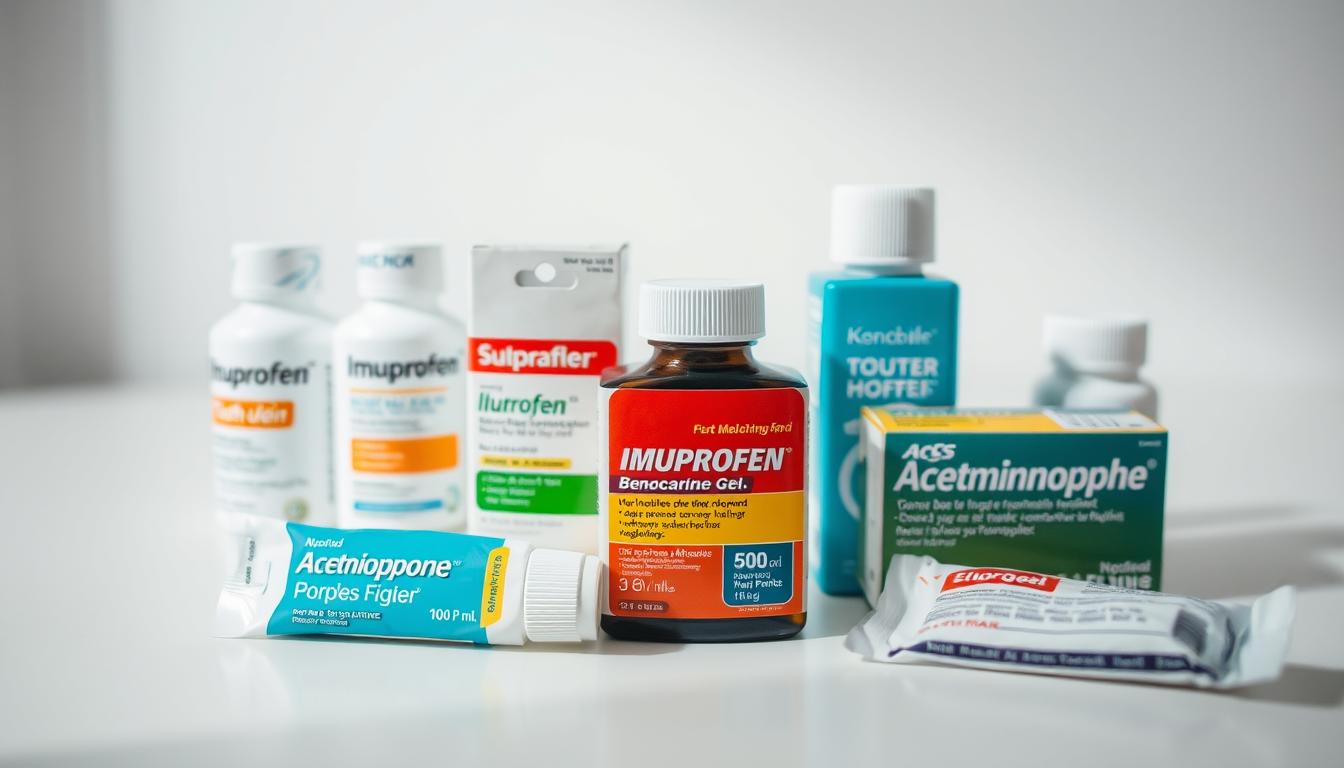
Every year, about 25% of US adults deal with sharp tooth pain. The hunt for the top over-the-counter remedy is tough for many. When toothaches hit, finding quick and effective relief is crucial. People often turn to ibuprofen, naproxen, and acetaminophen. So, which one is best?
The American Dental Association recommends NSAIDs like ibuprofen and naproxen for basic dental pain. They’re great at stopping the enzymes and prostaglandins that cause pain. But, there are risks. Too much NSAID use can cause bleeding and stomach ulcers. Too much acetaminophen may harm the liver. Following dosage advice, such as taking 400 mg of ibuprofen with 1,000 mg of acetaminophen, can relieve pain safely.
Key Takeaways
- NSAIDs, like ibuprofen and naproxen, are praised by dentists for reducing inflammation and easing toothache pain.
- Acetaminophen doesn’t reduce swelling, but it’s good for pain and fever. It’s a choice for those who can’t take NSAIDs.
- Following the dosing directions is key to avoiding problems like stomach issues or liver harm.
- Using ibuprofen and acetaminophen together can be a strong way to handle tooth pain safely, for a short time.
- To pick the best over-the-counter painkiller for tooth pain, think about your health and talk to a doctor if needed.
Understanding Tooth Pain and Its Causes
Tooth pain can really affect your life, often signaling deeper problems needing quick action. Knowing why tooth pain happens is key to managing toothache right and stopping serious dental issues. This understanding points to the best toothache remedy.
Common Causes of Tooth Pain
Many things cause tooth pain, coming from different parts of the mouth or its surroundings. Main causes include:
- Dental cavities due to decay are common, made worse by poor oral hygiene.
- Cracked teeth show the sensitive insides.
- Gum infections or diseases cause tooth-related pain.
- Roots get sensitive if gums pull back, exposing them to outside triggers.
Knowing these triggers helps those looking for ways to manage toothache and get better.
When to Seek Professional Help
It’s crucial to know when tooth pain needs a dentist’s attention to avoid serious issues or tooth loss. Key symptoms for seeking help include:
- Pain that stays more than two days
- Pain that over-the-counter drugs can’t ease
- Problems with chewing or biting
- Red, swollen gums, signs of infection, fever
- Bad taste or constant bad breath
Quick help from a dentist is important for managing toothache and keeping teeth healthy.
Starting to have tooth pain can scare you, pushing towards understanding its causes and quick professional help. By acting fast and knowing the causes of tooth pain, managing discomfort can bring fast relief and prevent worse dental problems.
Types of Over-the-Counter Painkillers
When dealing with tooth pain, there are mainly two types of OTC medicine. These are Nonsteroidal Anti-Inflammatory Drugs (NSAIDs) and acetaminophen. Both are key in managing different kinds of tooth pain.
Nonsteroidal Anti-Inflammatory Drugs (NSAIDs)
NSAIDs are great for dental pain because they tackle pain and reduce swelling. Popular ones are ibuprofen, also known as Advil, and naproxen, found in Aleve. These OTC toothache medicines help lessen the sharp pain common with dental issues.
NSAIDs block chemicals in the body that lead to inflammation and pain. This makes them ideal for swollen gums or pain after dental work like extractions or root canals.
Acetaminophen: An Overview
Acetaminophen, known as Tylenol, is another go-to for dental pain. It doesn’t fight inflammation but is terrific at calming pain and fever. This makes acetaminophen for tooth pain good for those who can’t take NSAIDs or have pain with little swelling.
Acetaminophen eases pain by acting on the brain to block pain signals. It’s effective for mild to moderate dental pain, providing relief and reducing fevers.
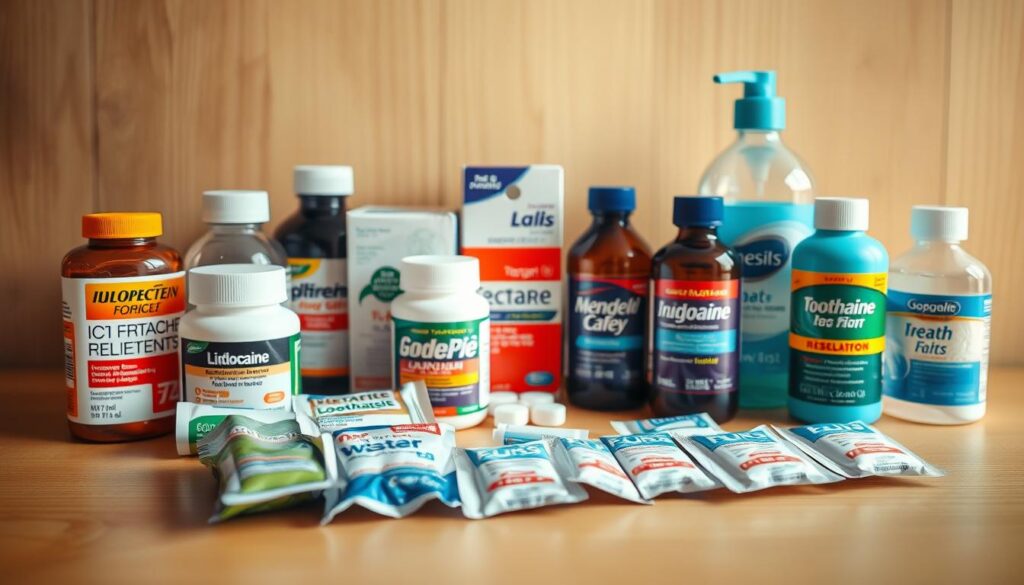
Choosing between NSAIDs and acetaminophen depends on your symptoms and medical history. For example, acetaminophen is safer for those at risk of bleeding. But NSAIDs are better for pain with swelling and redness.
In the end, both NSAIDs and acetaminophen are effective for toothache relief. They work differently to ease pain and related symptoms in dental issues. Always follow the package directions or talk to a healthcare provider to make the best choice for your health and dental needs.
How NSAIDs Work for Tooth Pain Relief
Nonsteroidal anti-inflammatory drugs (NSAIDs) are key in treating dental pain. They are well-known for their ability to relieve tooth pain. By attacking the main causes of discomfort, NSAIDs not only lessen pain but also help with inflammation reduction. Learning how these drugs work can make them more effective for use.
Reducing Inflammation
NSAIDs mainly help by reducing inflammation to relieve tooth pain. They block cyclooxygenase (COX) enzymes, COX-1 and COX-2. These enzymes are important for making prostaglandins, which cause inflammation. By stopping these prostaglandins, NSAIDs lower swelling and inflammation tied to NSAIDs for dental pain.
Blocking Pain Signals
NSAIDs also help by blocking pain signals to the brain. This reduces pain and increases overall comfort. Their ability to block pain and lower inflammation makes them vital for dental pain management. For best pain relief and inflammation reduction, use these drugs as prescribed.

NSAIDs are a dependable way to manage dental discomfort, but they must be used correctly. Risks like stomach irritation or more bleeding are reduced with proper use. This shows why it’s crucial to follow safe dosing rules.
| NSAID | Primary Action | Benefits | Potential Risks |
|---|---|---|---|
| Ibuprofen | Blocks COX enzymes | Reduces inflammation, alleviates pain | Gastrointestinal issues |
| Naproxen | Suppresses prostaglandin production | Long-lasting pain relief | Increased risk of cardiovascular events |
| Aspirin | Inhibits thromboxane A2 | Anti-inflammatory, analgesic | Possible bleeding disorders |
When used wisely, NSAIDs can significantly enhance life quality for those with dental pain. They ensure health and well-being are maintained.
Acetaminophen for Tooth Pain: Pros and Cons
Acetaminophen is often picked for tooth pain because it’s good at easing pain. It works by blocking pain signals in the brain. This helps with discomfort and fever. But, it doesn’t lower swelling, which can be a downside for some pain causes.

How Acetaminophen Works
It helps by changing how our brain handles pain and temperature. It’s very helpful for severe pain. You can use it with NSAIDs to better manage pain, without relying too much on them.
Potential Side Effects
Acetaminophen is great for tooth pain, but there are risks. The main risk is liver damage. This can happen if you take too much (more than 4,000 mg a day for adults). So, it’s important to follow how much you take.
| Benefits | Risks |
|---|---|
| Effective pain relief | Liver damage with overdose |
| Fever reduction | Potential for accidental misuse |
| Can be used in rotation with NSAIDs | No anti-inflammatory properties |
Knowing the benefits and limits of acetaminophen is key for treating tooth pain. Always talk to a health expert before taking any medicine for dental pain.
Comparing Ibuprofen and Acetaminophen
When dealing with tooth pain, picking the right painkiller is key for relief. Ibuprofen and acetaminophen are common choices. Knowing how they differ helps you decide wisely.
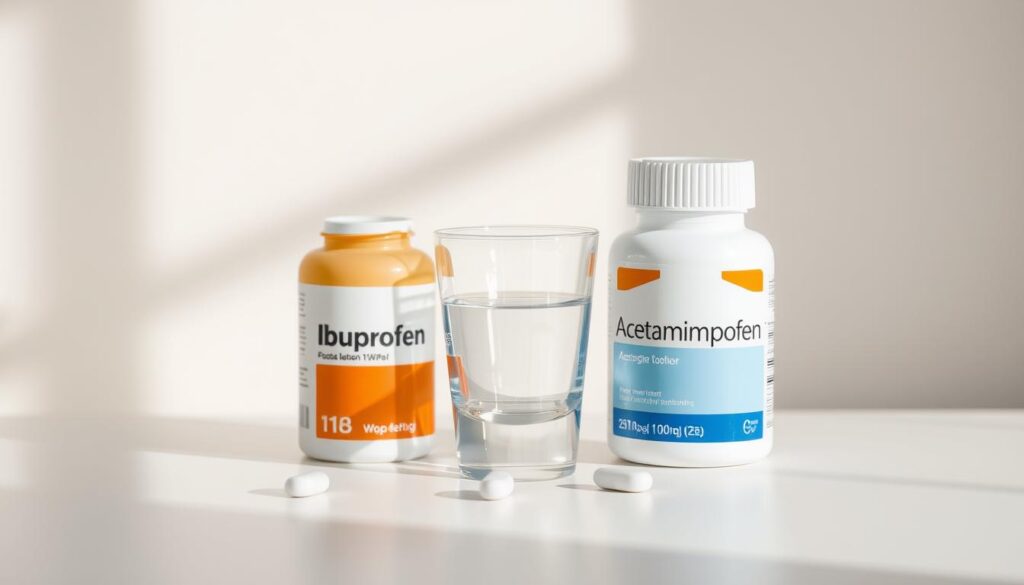
Ibuprofen is great for reducing inflammation and easing pain, perfect for serious dental aches. Acetaminophen, not anti-inflammatory, is favored for mild to moderate pain because it’s gentler on the stomach.
Risks and Recommendations
Both drugs are safe if taken correctly, but they have risks. Too much ibuprofen can upset your stomach or harm your kidneys. Acetaminophen is easier on your stomach but can damage your liver if you take too much.
| Medication | Function | Common Dosage | Key Consideration |
|---|---|---|---|
| Ibuprofen | Anti-inflammatory | 200-400 mg every 4-6 hours | Monitor for gastrointestinal distress |
| Acetaminophen | Analgesic, Fever reducer | 500-1000 mg every 4-6 hours | Be cautious of liver health |
For really bad dental pain, doctors may suggest using both ibuprofen and acetaminophen. This approach can increase relief and lessen side effects. Always talk to a healthcare provider before changing your pain management plan.
Dosage Guidelines for Over-the-Counter Painkillers
Getting the right dose of painkillers is key for treating tooth pain safely and effectively. The amount you need depends on the medicine and your health.
| Medication | Recommended Dosage (Adults) | Frequency | Maximum Daily Dose |
|---|---|---|---|
| Ibuprofen | 200 to 400 mg | Every 4 to 6 hours | 3200 mg |
| Acetaminophen | 500 to 1000 mg | Every 4 to 6 hours | 3000 mg |
When using OTC meds for tooth pain, pay attention to how your body reacts. If your pain doesn’t go away, see a doctor. Don’t go over the recommended dose or how often you take it without a doctor’s OK.

Always talk to a healthcare pro if you’re not sure what you need. This is extra important if you have other health issues.
Other Options for Tooth Pain Relief
While oral medications are commonly used for dental pain, there are other effective ways for tooth pain relief over the counter. These include topical anesthetics and cold compresses. These alternatives can help a lot, especially for those who can’t take oral painkillers.
Topical anesthetics like benzocaine are in Orajel and Anbesol. They numb the area quickly by blocking pain signals. You can safely use these up to four times a day, as directed. They give rapid, temporary relief, which is very helpful until you can see a dentist.
Using a cold compress is another good method. It lowers swelling and numbs the area, lessening the pain for a while. By putting a cold compress on your cheek near the sore tooth, you reduce swelling. This gives you a break from the pain.
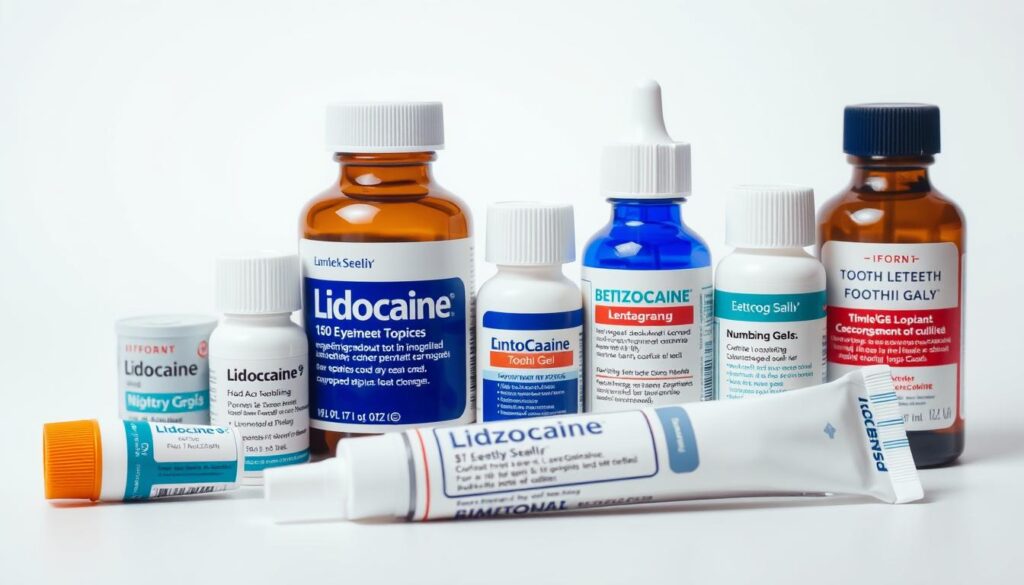
| Method | Effectiveness | Application Ease | Suitability |
|---|---|---|---|
| Topical Anesthetics | High | Very Easy | Most individuals except those with specific allergies to ingredients |
| Cold Compress | Moderate to High | Easy | Ideal for temporary relief, not suitable as a long-term solution |
Looking into these tooth pain relief options can really help those in need. Each one can ease a toothache temporarily while you get ready for a dentist’s care.
Safety Considerations for OTC Painkillers
When dealing with tooth pain, knowing the safety of toothache medicines is key. OTC toothache medicines are easy to get and can really help. But, it’s vital to be careful to avoid bad reactions and make sure they work well with your health.
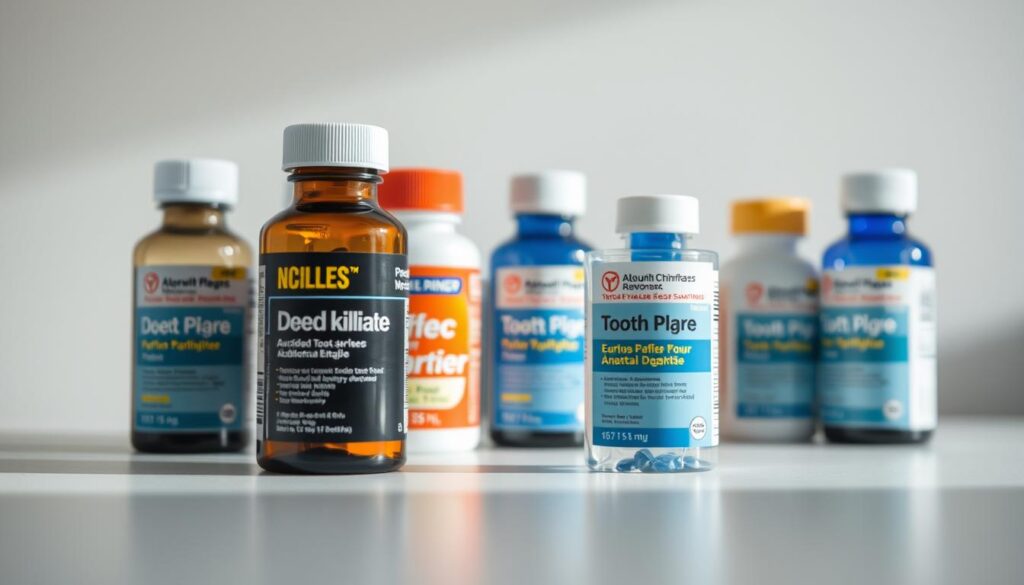
The kind of OTC toothache medicine and your health background both matter a lot. Think about your health, like how your liver works or if you have stomach issues. These factors help decide which painkiller is the right choice for you.
| Medication | Considerations | Common Interactions |
|---|---|---|
| NSAIDs (e.g., Ibuprofen) | Not recommended for people with stomach ulcers or bleeding problems | May have issues with blood thinners and high blood pressure meds |
| Acetaminophen | Be careful if you have liver issues | Could react with alcohol and some other meds |
Dealing with medicine interactions is tricky. Always read labels and talk to doctors or pharmacists. Working together helps lower risks and boosts the safety of toothache medicines. By learning about OTC toothache medicine, you can handle tooth pain smartly and stay healthy.
When to Choose Aspirin for Tooth Pain
Aspirin is known for its heart benefits and its ability to lessen tooth pain. Choosing aspirin for a toothache means knowing its pros and cons.

Benefits of Aspirin for Dental Pain
Aspirin helps fight inflammation, making it good for tooth pain relief. It stops the body from making chemicals that inflame and hurt the tooth area. Here are some benefits:
- It effectively reduces swelling from dental issues.
- It offers quick relief for mild toothaches.
- It can be used with other pain treatments.
Risks and Side Effects
Although useful, aspirin comes with risks, especially if misused. Consider the following:
- It can cause stomach ulcers or discomfort if not taken with food.
- There’s a bleeding risk, especially for some people or with certain drugs.
- Those with liver or kidney problems should be careful.
Using aspirin for tooth pain needs careful consideration. It’s a strong option for tooth pain relief but has to be used correctly, keeping in mind possible side effects.
Alternative Remedies for Tooth Pain
Even though over-the-counter painkillers are common for toothache, trying different methods is valuable. This part looks into natural and home treatments for dental pain. We highlight traditional remedies that have been effective for many years.
Natural Remedies Worth Considering
If you need a toothache remedy, some natural solutions can help ease the pain. For example, clove oil is famous for its eugenol, which helps with pain and germs. Putting a little bit on the sore spot can reduce pain for a while.
Using a saltwater rinse is another good home treatment for toothache. It cleanses the area, lowers swelling, and kills bacteria. Also, putting a warm or cool peppermint tea bag on the gums can ease pain for some time.
Also, cold compresses on the cheek can lessen swelling and numb the pain. This is another way to get natural tooth pain relief temporarily.
The Role of Home Care
These natural remedies can help with mild to moderate tooth pain but they don’t replace seeing a dentist. If the pain doesn’t go away or gets worse, a dentist visit is important. They can find and treat the real problem.
Using these home solutions along with a dentist’s advice is a smart way to take care of your teeth. This can make you more comfortable and help you recover faster.
Conclusion: Selecting the Right Painkiller
Choosing the right over-the-counter painkiller for tooth pain is about making a smart choice. You must understand the different treatments for tooth pain. Knowing the type, frequency, and how bad your toothache is helps you pick the right painkiller. Learning about NSAIDs, acetaminophen, and other options is key.
Getting advice from healthcare professionals is very important if you want the best painkiller for tooth pain. If you have health issues or are taking other medicines, talking to a healthcare provider is essential for safe treatment.
Here’s a quick comparison of tooth pain treatment options. It shows how each option helps with different pain aspects:
| Type of Painkiller | Pros | Cons |
|---|---|---|
| NSAIDs | Reduces inflammation and effectively manages moderate pain | Can cause stomach upset or risk of bleeding |
| Acetaminophen | Less irritation to the stomach than NSAIDs | Less effective at reducing inflammation |
| Aspirin | Helps with inflammation and fever reduction | Not recommended for children or those with certain health conditions |
Talking with a healthcare provider helps find the right painkiller for you. They can offer tailored advice based on your health, current treatments, and tooth pain details.
Frequently Asked Questions About Tooth Pain Relief
Dealing with tooth pain involves knowing how long you can take OTC pain meds. It’s also important to be aware of allergies. We will cover common questions about easing tooth pain. This helps patients manage their pain better.
How long can I take OTC painkillers?
How long you can safely use OTC painkillers for tooth pain depends on the drug and your health. Usually, following the package’s dosing instructions for 3-5 days is safe. If pain stays, see a doctor instead of taking more pills. Taking too much can cause side effects or hide serious issues needing a doctor’s care.
Are there any allergic reactions to watch for?
Knowing the signs of allergic reactions to painkillers is key. Watch for hives, trouble breathing, or swelling in your face and throat. If any of these happen, get medical help right away. Also, check the ingredients if you’ve had allergies to similar meds before.
Here’s a quick reference table listing common OTC painkillers and known allergens:
| OTC Painkiller | Common Allergens |
|---|---|
| Ibuprofen | Soybean oil, Maltodextrin |
| Acetaminophen | Povidone, Cornstarch |
| Aspirin | Cornstarch, Microcrystalline cellulose |
Understanding the Role of Your Dentist
Having regular dental check-ups is crucial for keeping your mouth healthy. Not only do they help prevent problems, but they also catch issues early. This makes treatment easier and less painful.
Going to the dentist regularly is key to dealing with tooth pain effectively. Dentists can spot the real reasons behind toothaches. Sometimes, a small ache could be a sign of something more serious, like gum disease or cavities.
If you have severe tooth pain, don’t wait to see a dentist, especially if there’s swelling or fever. These signs could mean you have an infection that needs quick treatment from a professional, not just home cures or store-bought meds.
A good habit of dental check-ups can prevent the need for urgent dental visits. Your dentist does more than just fix problems. They give personalized advice to keep you healthy, which supports your overall well-being.
Final Thoughts on Pain Management
To effectively manage toothache, it’s key to find a good balance. Immediate pain relief is important, but so is a plan for oral health maintenance. This dual approach deals with the discomfort now and helps keep teeth healthy in the future.
Balancing Pain Management and Oral Health
Dealing with a toothache means tackling both immediate pain and your mouth’s overall health. Regular habits like brushing twice daily, flossing, and using antimicrobial mouthwash play a big part. These habits keep your mouth clean and reduce the chance of toothaches.
Also, cutting down on sugary foods and drinks, and not smoking, are key. These steps are crucial for keeping your mouth healthy, outlined as oral health maintenance.
Preparing for Future Dental Issues
Planning for dental health isn’t just about current problems. It’s about looking ahead to avoid future issues. Regular dental check-ups help find and fix problems early. During these visits, you get advice that’s just right for you, which is very important for keeping your teeth healthy over time.
- Annual dental check-ups
- Personalized dental care plans
- Proactive treatments for potential dental problems
By using these planned approaches to toothache and dental health, people can take care of their pain now. At the same time, they’re working towards a healthier mouth in the future.
Additional Resources for Tooth Pain Relief
This article talked a lot about over-the-counter painkillers for tooth pain. But there’s more help out there for those in need. It’s important to keep learning about how to handle dental pain. Finding reliable online dental care advice is a key step.
Also, connecting with local oral health services can really help. They can offer the expert care needed for tooth pain.
Online Dental Care Information
The web has lots of info on dental health, including the latest research and tips. For those dealing with tooth pain, there are many websites with medically checked facts. They talk about symptoms, how to treat them, and how to avoid problems in the future.
These websites aim to teach patients. They help you know how to ease pain yourself and tell you when to see a pro.
Local Dental Health Services
Local oral health services are a link between looking after yourself and getting professional care. They help patients get the right treatment for their dental health issues. These services offer quick treatments and help plan for healthy teeth in the long run.
Using local expertise means you get help for tooth pain now and support to avoid problems later.


